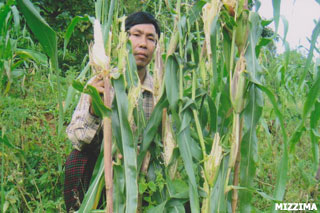New Delhi (Mizzima) – A survey conducted by the United Nations Development Programme (UNDP) has found that Chin State remains the poorest state among 14 regions and states in Burma with 73.3% per cent of the people below the poverty line.
The UNDP collected data from more than 18,000 households across the country in 2009-10. A similar survey was conducted in 2004-05 and it found 32.1 per cent of the people were below the poverty line. Many states and regions had a decrease in poverty, but in Rakhine, Rangoon, Irrawaddy and Karen states and regions, the poverty figures increased.
 The survey was conducted in cooperation with the government Planning and Economic Development Ministry and then joined later by another UN agency, UNICEF, and the Swedish International Development Agency (SIDA).
The survey was conducted in cooperation with the government Planning and Economic Development Ministry and then joined later by another UN agency, UNICEF, and the Swedish International Development Agency (SIDA).
The leader of Zomi National Congress (ZNC), Pu Cing Sing Thang, told Mizzima that there were many reasons behind the poverty in Chin State.
“Our state is in a remote and far-flung area, the government neglects our state for development work, the road transport communication is poor and underdeveloped and the worst in Burma. And at the same time we cannot rely on the government for development work,” he said.
Chin National Party (CNP) Chairman Zo Zam said that Chin State has many disadvantages for development and there are very few natural resources in the state.
“Chin State is the only state in country where there is no plain area. We have to use manual labour even for building a football field. All places in our state are 3,000 feet above sea level. Natural resources are scarce in our state too. Some deposits of natural resources are underground but we have no capacity to extract them under the current situation,” he told Mizzima.
The survey, called “Integrated Household Living Conditions Survey II,” and a report were released in June 2011. Data were collected on ownership status, living conditions and millennia development goals of Burma.
According to the data, Kayah State had 11.4 per cent in poverty; Rangoon Region had 16.1 per cent. Rakhine State was the second worst with 43.5 per cent.
“Kayah State has a population of 300,000 and Chin State has 500,000. Kayah State has a production works and many plain areas in the state. They can produce many products and there the per capita income has risen too. They have low population but higher production. So they have less poverty than us. But in our state, the job opportunities are shrinking,” Zo Zam explained.
Pu Cing Sing Thang also pointed out the different historical background. “In the English colonial period, Kayah State was a buffer state between the English colony and Thailand. So they could have access to both Burma and Thailand for resources. The communication was good. It is very close to Thailand. But for Chin State, we have no access to India. We have to rely on Burma,” he said.
The survey included data on households, household utilities, education, literacy, health, nutrition, death rates, occupation, livelihood, spending and savings.
According to the survey, Chin State has the highest number of family members in each household with six people per household. The state is losing its labour force as many young people migrate to foreign countries for employment, Zo Zam said.
“This is one of the main reasons for poverty in the state. No workforce means no production. No production means no income,” he said.
Pu Cing Sing Thang said that another reason the young migrate to foreign countries for employment is the rampant forced labour in the state.
“The army units force them to work in their coffee plantations without paying any wage. The local people have to work on forced labour and leave their own work. So many people migrate to seek greener pastures. But the actual situation is not as they expected. The remittances made by our peoples are not high,” he said.
Tens of thousands of migrant Chin workers are in Malaysia and India. According to the chief of mission of the UNHCR in New Delhi, there are growing numbers of underage children without accompanying parents in New Delhi who have applied for refugee status.
Chin State assembly legislator from Tiddim constituency (2) Zo Zam suggested that the government should promote agriculture and livestock breeding in Chin State and open an education programme.
Most Chin youth attend school only up to Grade 10 in Chin State and they must go to other states and regions for higher studies.
“We are still underdeveloped and ignorant in these fields. If they cannot open an Agriculture University in our state, they should open an agriculture institute here. We need such training in our state. We could work on model farms after better training,” he said.
“Policy makers should see the reality of Chin State as the most underdeveloped area and its dismal condition. If they cannot make Chin State better in next five years, I fear for our state,” he said.


